仁爱版英语教学课件.doc
Unit 6 Topic 1 Section A(课件)九年级英语下册(仁爱版)

读音 音标
单词
例句
[fɔ:l in lʌv]
fall in love (with sb.) He fell in love with her
爱上(某人)
at their first meeting.他
对她一见钟情。
1.The (结局) of the story is very surprising. 【答案】ending 2.Qufu is where Confucius was born, so it’s very 育意义的).
a['cætkretrɪsss]es are attractive.
attract
马丽亚:对我来说学中国象棋太难了。空闲时间,我喜欢看
电视,尤其是电视剧。我觉得那些女演员很好看。
Jane:I want to be a famous singer like the singing stars I see on TV. They are so charming.、 简:长大以后我也想成为电视上那样的歌星。他们太 迷人了。 Michael:I would rather watch sports shows than those ones. 迈克尔:我宁愿看体育节目也不愿意看那 Kangkang:So would I. I like watching soccer games best.康 康:我也是。我最喜欢看足球赛了。
英
Unit 6 Entertainment and Friendship 1. I would rather watch sports shows than those ones.
Section A
语
九年级下册 仁爱版
仁爱版 英语九年级上册
九年级英语上册-仁爱版.课件

第七页,共13页。
Kangkang :
… When he was a child, most families in the country had at least three or four children. At that time, China was the country with the largest population in the
第六页,共13页。
3a Listen, read and say
Maria: Oh, Kangkang. What a nice photo! You looked so cute !
Kangkang: Yes, everybody loved me so much!
Maria: But the family in the other photo is very big. It seems that their living conditions were not very good.
really hate to go shopping. Maria: So do I.
第四页,共13页。
2 Work alone
• Answer the following questions according to 1a
1. Where has kangkang just been ?
2.What happened to kangkang and Michael ?
1. I've just tried to call you. 2.Have you found him yet? 3.He has already gone home.
七年级上册仁爱版英语课件

Restaurant types: There are many different types of restaurants, including fast food, casual dining, fine dining, and ethnic restaurants that specialize in cuisine from a specific country or region.
Clubs and organizations
01
Lists the various clubs and organizations available at the school, including their meeting times and activities.
Extracurricular activities
Curriculum overview
Details the requirements for each subject, including the credits needed to graduate and any prerequisites for advanced courses.
Subject requirements
详细描述
Unit 4: Daily Life
04
总结词
列举周末常见的休闲活动。要点一要点二Fra bibliotek详细描述
On weekends, students often have time to rest and relax. They might watch TV, read books, play video games, or go out with friends. Other popular weekend activities include sports, hobbies like painting or music, or helping around the house.
仁爱版英语七年级上册Unit 1 Topic 3 How old are you (Section ABCD)教学课件
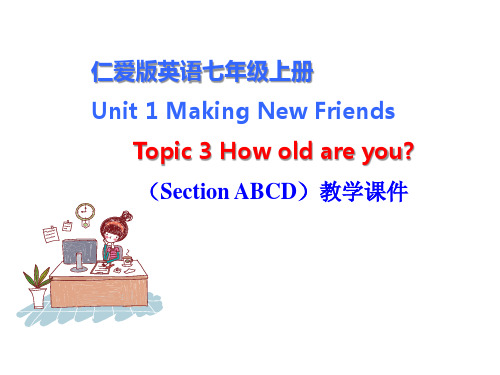
QQ number
What’s your QQ number?
one
eleven
你 two
twelve
发 three
thirteen
现 four + teen = fourteen
规 five
fifteen
律 six + teen = sixteen
了 seven + te say.
Excuse me, what’s this in English?
(视频P19-1a)
map
eraser
It’s an eraser.
pen pencil desk
A: What’s this in English? B: It’s a pen. A: How do you spell it? B: P-E-N, pen. A: Thank you. B: That’s OK.
(录音P18-3)
Hello, Maria! What grade are you in?
I’m in _G__ra_d_e_ _S_e_v_e_n_.
Are you in Grade Seven, too?
Yes, I am.
Who’s that?
That’s Nancy.
How old is she? What class is she in?
A: What’s that in English? B: It’s a toy. A: Can you spell it, please? B: Yes. T-O-Y, toy. A: Thanks. B: You’re welcome.
It’s __a__b_o_o_k_.
What’s that in English?
仁爱版初中英语ppt课件

四、There be 句型的一般将来时
1. There be句型的一般将来时肯定句结构为
。 1)There will be… 2)There is/ are going to be…
2. There be句型的一般疑问句结构为:
1)Will there be… 2) Is/ Are there going to be…
2. There will be a teachers’ relay race this afternoon. 今天下午将会有一场教师接力赛。
3. Will there be schools in the future? 将来还会有学校吗? Yes, there will./No, there won’t.
2
二、标志性词
1.tomorrow系列 :
tomorrow the day after tomorrow tomorrow morning tomorrow afternoon tomorrow evening at 7:00 tomorrow morning ……
3
2. next 系列
next
a football match tomorrow afternoon.
A. was
B. is going to be
C. will have
D. is going to have
5. _____a lot of books for your classmates next term?
A. Are there will B. Is there going to be
9
结构二: 由“be going to+动词原形”构成
1. I__a_m__g_o_in__g_t_o_b_u_y_(buy)a book tomorrow. 2. He _is__g_o_in_g__to__t_a_k_e_(take) a trip in two days.
仁爱版九年级英语上册课件Unit 1 Topic 2 Section A
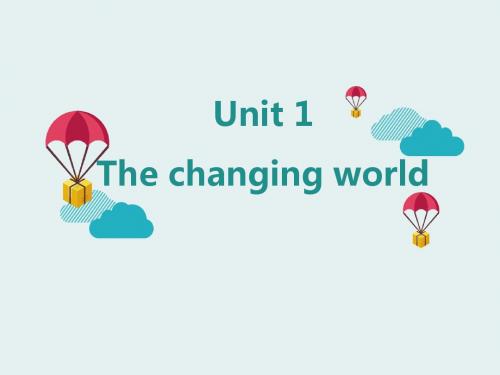
【链接】never 多用于否定陈述句, ever 多用于疑问句,问初次经历, just 位于谓语动词以后,before 一 般放在句末。
例如: 1). ---Would you like to go to see the film?
---No, I’ve seen it already. 你想去看电影吗? 不,这部电影我已经看过了。
2. ---I really hate to go shopping. ---So do I. So do I. 为倒装句。
表示前面提到的肯定情况也同样适合另 外一个主题。表示“ 某某也一样” 其 结构“so +be/情态动词/助动词+主语”
例如: Kangkang is a clever student. So Maria is. 康康是个聪明的学生。Maria 也是。
Grammar
1. --Have you found him yet? --Yes ,he has already gone home.
yet, already 是副词,表示“已经,仍然, 还 ”。 already 多用于现在完成时态的肯定句, 可放在句中,也可放在句末。 yet常用在现在完 成时态的否定句和疑问句, 常放在句末。
expressi 2.Have you found him yet?
ons
3.He has already gone home.
Homework
1. Make five sentences, using ever, never, yet, already and just.
2. Preview Section B.
Unit 1 The changing world
Topic 2 The population in developing
Unit 5 Topic 1 Section B(22页)仁爱版七年级下册英语课件
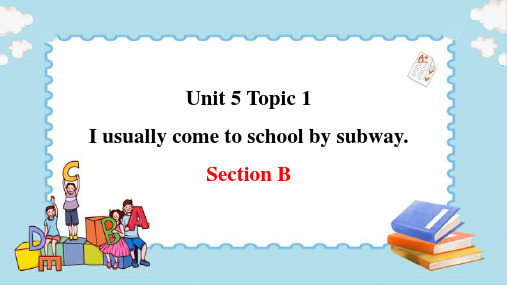
Read 1a again and fill in the blanks.
Helen: Michael,what time do you usually _g_e_t _u_p__?(起床) Michael: I always get up _a_t about six o'clock. Helen: The early bird catches the worm. _H_o_w_do you usually come to school? Michael: I usually come to schoolo_n__fo_o_t, but _so_m__e_ti_m_e_sby bike. How about you ? Helen: I _s_e_l_d_o_m_ walk to school . I _o_f_t_en___ come by subway. What about you Sally? Sally: I _n_e_v_e_r _come to school by subway. I _a_lw__ay_s_ take a bus.
Hale Waihona Puke Activity watch TV in Frequency the afternoon
always
usually
often
sometimes
seldom
never
√
play soccer on Sundays
√
see a movie √
课堂总结
We learn: 1. some words: weekday, early, bird, catch, seldom, walk, never, ride, park, watch 2. some phrases: take a bus/car, do one’s homework watch TV, see a movie, play soccer 3. some sentences: The early bird catches the worm. I never come to school by subway.
仁爱版英语八年级PPT课件

happily as before.
v. 接受
Please give my best wishes to your parents.
Yours,
第4页/共23页
Li Hong
1a Read and understand.
第5页/共23页
1b Read 1a and complete the
table
第10页/共23页
Helen is as lovely as Maria.
Helen和Maria一样可爱。 表示两者在某一方面程度相同时, 用句型 “ as+形容词/副词原级+as+ 比较对象”
第11页/共23页
Helen is as helpful as Maria.
Helen does her homework as carefully as Maria.
Singing English songs can improve your listening and
pronunciation.
It’s a small world after all. It’s a small world after all. It’s a small world after all. It’s a small world after all. It’s a small, small world.
lovely brave helpful carefully fast
☆☆☆ ☆☆☆☆ ☆☆☆☆ ☆☆☆☆ ☆☆☆☆
☆☆☆
☆☆ ☆☆☆☆ ☆☆☆ ☆☆☆☆
e.g Helen is as lovely as Maria. And …. But … .
第14页/共23页
仁爱版英语七年级下册Unit8 Topic3 SectionC 课件
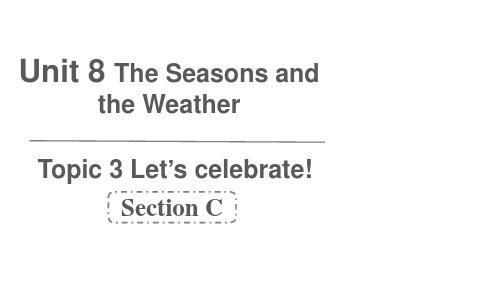
Could you _t_el_l_ me something about your favorite festival?
Please give my best wishes to your parents!
2b. Read 2a again and put the activities Julia did on Halloween in the correct order . Then tell your partner.
staTyheeunfpjaomaynilddy uawlmlagtpecthlitnothggeesthSaeptrrmfionrigdaPnbaiiggrhtdytinonnerT. V
put gogrneetetlhtuetchikreyinrmepwoancreloyntthses
1b. Read 1a and complete the table. You can add more.
___2____knocked on neighbors' doors ___1____colored faces white and mouths black ___3____shouted "Trick or treat !"
3. What is your favorite holiday or festival? What do people usually do on that day? Write a passage.
Answer
Read aloud and Retell the text
The Spring Festival
In China, the Spring Festival is _____ ____ ____. People usually start ____ _____ the festival one month before it comes. They prepare delicious food, and clean and ___ _____ _____. They also buy some new clothes. On ____ _____ _____ the festival, the family all _____ _____ for a big dinner. They _____ _____and enjoy dumplings ____ _____for good luck. On ____ ____ ____ ___ the lunar new year, childien ____ _____ their new clothes and _____ _____ ____.They are very happy to _____ _____ ____from them.
仁爱版英语ppt课件

Phonetic Alphabet Imitation
Students practice correct phonetic pronunciation by imitating the teacher's pronunciation.
Phonetic Comparison Exercise
Instrument feedback: Regular feedback from the instrument on student writing helps them identify areas for improvement and provide guidance on how to enhance their writing skills
Phonetic knowledge
02
Provide a detailed introduction to English phonetic symbols and their correct pronunciation, including the combination of vowels, consonants, and various phonetic symbols.
04
VS
This section demonstrates how to carry out a lifeboat drill, providing step by step instructions for effective emergency preparedness
Details
The lifeboat drill is explained in detail, including the necessary safety equipment, the correct procedures for boarding and exiting the lifeboat, and the importance of following the instructions
仁爱版八年级英语下册课件 Unit 7 Topic 1 Section A授课课件

5. Kangkang: Good! I’ll get in touch with Craig Kielburger on the Internet to get more information about him. 好!我将从网上与克雷格·柯伯格联系,了解 更多关于他的信息。
get in touch with 与……联系;和……接触 e.g. You can get in touch with the school by telephone or by e-mail. 你可以通过电话或电子邮件与学校取得联系。
Summary
We learn:
1. Some words: task, poster, touch, success, imagine, soup, cheese, cookie, pancake, set, blind
2. Some phrases: know about, raise money, food festival, turn to, make a poster, get in touch with, try one’s best, set the table
We can:
Make sentences with that guide the object clauses.
Exercise
一、选择填空
1. Jane: Do you know about Craig Kielburger? 你知道克雷格·基尔伯格吗?
know about了解,知道……的情况 e.g. He wants to know about Chinese culture. 他想了解中国文化。 know v. 知道,认识 e.g. I know her. She is our monitor. 我认识她。她是我们的班长。
仁爱版英语五年级上册册多媒体课件PPT课件优质课公开课 Book 5A Lesson 5
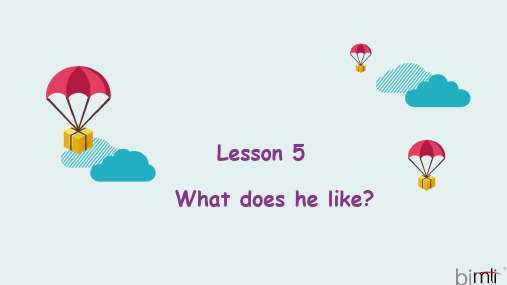
Review
Does he like swimming?
Yes, he does. He can swim very well. He often goes swimming in summer.
Review
What about ball games? Does he like football?
A: It’s a fine day, isn’t it? B: Yes, it is. A: What do you like to do in your free time? B: I like playing basketball. What about you? A: I like reading books.
✘ ✔
✔
✘ ✘ ✔
Listen and tick
Listen and say
A: It’s a fine day, isn’t it? B: Yes, it is. A: What do you like to do in your free time? B: I like playing basketball. What about you? A: I like reading books.
喜欢,享受
only
仅仅,只
Everyone in our family enjoys watching TV.
我们家每个人都喜欢看电视。
But we only have one TV.
但是我们只有一个电视机。
Let’s learn
What does … like? He/She likes …
Let’s practise
Yes, he/she does. No, he/she doesn’t.
仁爱版八年级英语上册 Unit 1 Topic 3 Section A 课件(共28张PPT)
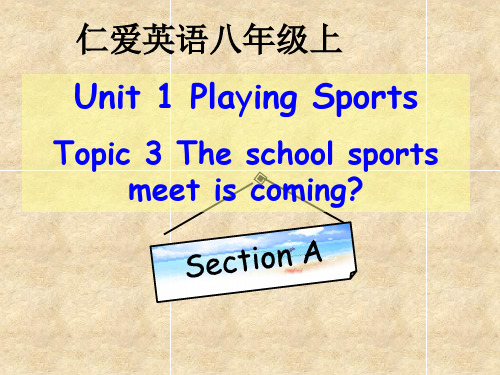
I believe
We learn ♥Expressions of taking part in sports meet:
join in,be in ,take part in、800-meter race ♥ The use of “will”.
TThhee lohnigghjujmumpp
cycling
swimming
basketball
football
running
the long jump the high jump
tennis
A:Which sport do you like best? B:I like… best. A:Why? B:Because …
Li Ming
school sports meet Yu Ting
1.校运动会__sc_h_o_o_l _s_po_r_t_s_m_eet 2.参加 t_a_k_e_p__a_r_t in = j_o_in__i_n_ = __b_e__i_n__
3.男子八百米赛 t_h_e__b_o_y_s’_8_0_0__-m__e_ter race
巧学妙记 一般将来时
一般将来时用法口诀:
一般将来时,将要发生事 谓语不一般,will加动原(动词原形) 要变疑问句,will提前面 否定句,也不难,will后面not添
中奖啦
2分
1
2
1分
1分
4
5
2分 3 3分 6
There will be our school sports meet next month.
仁爱英语多媒体教学初中九年级上册课件 Unit 1 Topic 2 Section B

A: Is she..? B: Yes, she is./
No, she isn’t. She is… A: Is she from…? B: Yes, she is.
No, she isn’t. She is from…
Work in pairs
▪Name: Beckham
Who is he?
Is she/he from…? Is she/he…?
Who is he?
Is she/he from…? Is she/he…?
In China, the family name often goes first, but in America, England, Canada, etc, it always goes last.
— Is she from Canada? — _____Y_e_s,_s_h. e is
是的,她是。
— Is he Li Ming?
— __N_o,_he_isn_’t_. H_e i_s Y_uk_io______.
事实是肯定的 就用yes 回答, 事实是否定的 就用no回答。
不,他不是。他是Yukio。
Yes, he is.
Is he from China?
Yes, he is.
Is he Kangkang?
No, he isn’t.
He is from America.
Is he from China?
No, he isn’t. He is Michael.
Work in pairs
▪ Name: Xie Na
Deng Yaping
Zhao Lin
Tom Cruise
仁爱版七年级英语课件
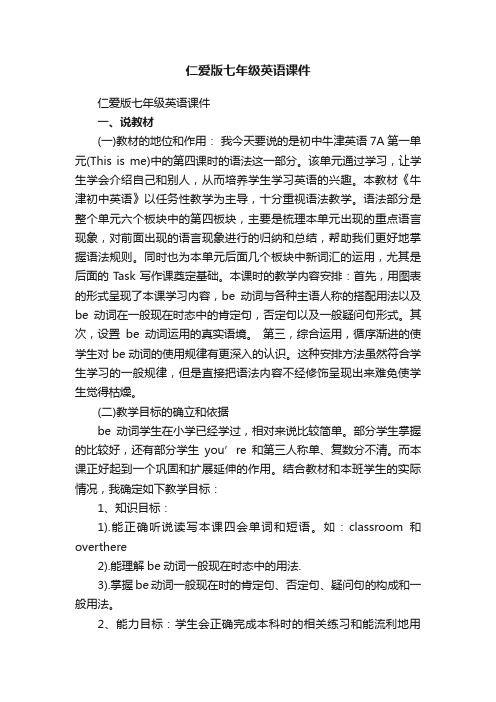
仁爱版七年级英语课件仁爱版七年级英语课件一、说教材(一)教材的地位和作用:我今天要说的是初中牛津英语7A第一单元(This is me)中的第四课时的语法这一部分。
该单元通过学习,让学生学会介绍自己和别人,从而培养学生学习英语的兴趣。
本教材《牛津初中英语》以任务性教学为主导,十分重视语法教学。
语法部分是整个单元六个板块中的第四板块,主要是梳理本单元出现的重点语言现象,对前面出现的语言现象进行的归纳和总结,帮助我们更好地掌握语法规则。
同时也为本单元后面几个板块中新词汇的运用,尤其是后面的Task写作课奠定基础。
本课时的教学内容安排:首先,用图表的形式呈现了本课学习内容,be动词与各种主语人称的搭配用法以及be动词在一般现在时态中的肯定句,否定句以及一般疑问句形式。
其次,设置be动词运用的真实语境。
第三,综合运用,循序渐进的使学生对be动词的使用规律有更深入的认识。
这种安排方法虽然符合学生学习的一般规律,但是直接把语法内容不经修饰呈现出来难免使学生觉得枯燥。
(二)教学目标的确立和依据be动词学生在小学已经学过,相对来说比较简单。
部分学生掌握的比较好,还有部分学生you’re和第三人称单、复数分不清。
而本课正好起到一个巩固和扩展延伸的作用。
结合教材和本班学生的实际情况,我确定如下教学目标:1、知识目标:1).能正确听说读写本课四会单词和短语。
如:classroom和overthere2).能理解be动词一般现在时态中的用法.3).掌握be动词一般现在时的肯定句、否定句、疑问句的构成和一般用法。
2、能力目标:学生会正确完成本科时的相关练习和能流利地用be动词以及所学句型结合本单元话题进行情景会话。
3、情感目标:本节课学生在学习语法知识的同时还能通过讨论发现交流的乐趣,培养合作的精神。
通过创设真实的情景激发学生学习英语的兴趣。
(三)重点和难点重点:学生理解和掌握be动词的相关内容和用法,能够正确使用be动词的三种句型,能较好完成be动词的相关练习题目。
仁爱英语教学资源课件

日期:contents •仁爱英语教材分析•仁爱英语教学策略•仁爱英语课堂教学设计•仁爱英语课外学习资源•仁爱英语水平测试与评估•仁爱英语教学案例分析目录仁爱英语教材分析01仁爱英语教材是由中国教育部仁爱教育研究所专门为我国学生量身打造的英语教材,旨在提高我国学生的英语听、说、读、写能力。
该教材自2006年开始使用,目前覆盖了全国多个省份的中小学生,是教育部推荐的全国通用英语教材之一。
教材简介教材特点注重口语交际能力的培养,教材中设置了大量的对话和口语练习,帮助学生提高口语表达能力。
教材难易程度适中,适合不同层次的学生使用。
教材内容生动有趣,图文并茂,容易引起学生的兴趣。
教材配套资源丰富,包括教师用书、练习册、录音带等,方便教师教学和学生自学。
教材内容与结构教材共分为8个单元,每个单元都有一个主题,涵盖了生活、学习、工作等多个方面。
每个单元都分为4个部分,分别是听、说、读、写技能训练。
每个部分都包含有多个活动,旨在帮助学生掌握该部分的词汇、语法和技能。
仁爱英语教学策略02教学原则教学过程中应充分发挥学生的主体作用,尊重学生的意见和想法,引导学生主动参与学习。
尊重学生的主体地位注重语言交际能力倡导自主学习强化教学反思仁爱英语教学的目标是培养学生的英语交际能力,因此,在教学过程中应注重语言的实际运用。
教师应积极引导学生进行自主学习,培养学生的学习积极性和自我管理能力。
教师应对教学过程进行反思,总结经验,发现问题,并及时调整教学策略。
教学方法情景模拟教学法通过模拟真实场景,让学生在模拟的情境中学习和运用英语。
个性化教学法针对学生的不同特点和需求,制定个性化的教学方案,最大限度地发挥每个学生的潜能。
游戏教学法利用游戏的方式激发学生的学习兴趣,让学生在轻松愉快的氛围中学习英语。
任务型教学法通过设置具体任务,引导学生完成学习任务,从而培养学生的英语运用能力。
利用多媒体技术,如图片、视频、音频等,丰富教学内容,提高教学效果。
- 1、下载文档前请自行甄别文档内容的完整性,平台不提供额外的编辑、内容补充、找答案等附加服务。
- 2、"仅部分预览"的文档,不可在线预览部分如存在完整性等问题,可反馈申请退款(可完整预览的文档不适用该条件!)。
- 3、如文档侵犯您的权益,请联系客服反馈,我们会尽快为您处理(人工客服工作时间:9:00-18:30)。
仁爱版英语教学课件课件是为了我们更好的工作,各位同学们,我们一起看看下面的英语教案吧!仁爱版英语教学课件一、说教材教材的地位及作用本课是第5单元第2话题的A部分本单元主要是有关学校生活的话题:Our School Life. 在Topic 1中通过一般现在时态学习了各种不同的上学方式,而本话题在Topic 1的基础上,学习学校生活中的各种活动,从而学习现在进行时态的用法。
其中,Section A让学生初步了解现在进行时态的用法、含义。
教学目标根据《英语课程标准》以及本单元的话题,我将本课的教学目标分为:知识目标、能力目标和情感目标3个方面。
(1)知识目标:①学习有关学校各种建筑物的生词和一些其他生词:playground,gym,dormitory,lab,computer room,dining hall, classroom building, swimming pool, make, card, soon, dance, sleep, clean, run②学习现在进行时态的含义和用法:结构:be+v-ing含义:本课中是表示说话时正在进行的动作或发生的事情。
(但我们教师必须心中有数该时态还有另外两种含义:a表示当前一段时间内的活动或现阶段正进行的动作;b表示将来)(2)能力目标①提高学生听说读写的能力②培养学生主动参与学习活动、善于和他人合作的能力。
③培养学生学以致用的能力(3)情感目标:培养学生热爱学习、热爱劳动、热爱运动的意识。
教学重点、难点:(1)教学重点:理解现在进行时态的含义、用法,学习本课生词,培养学生合作学习的意识;(2)教学难点:现在进行时态的结构(be+v-ing),灵活运用现在进行时态,19个之多生词。
理论依据:(1)根据教学目标,确定本课19个生词和灵活运用现在进行时态为本课的重点难点。
现在进行时态是课程标准要求学生掌握的重要时态之一,在其结构中,学生往往只注重v-ing而忽视be 的使用,有时甚至遗漏。
因此要注意对学生进行正确的、反复的语言输入。
(2)《英语课程标准》中指出我们要倡导体验、实践、参与、合作与交流的学习方式和任务型的教学途径,发展学生的综合语言运用能力二、说教法1. 直观教学法。
根据校情,我在本课中尽量使用语言直观(包括肢体语言)、教具直观进行教学。
课前安排2位善于绘画的学生把本课的1a、2a、3、4的图片画成4张大型的教学挂图。
使用直观教学法是符合七年级学生的年龄特征(认识事物从感性认识上升到理性认识)。
2. 任务型语言教学法任务型教学活动是让学生通过运用语言来完成各种各样的交际活动,学生通过交际的形式来学习和掌握语言。
在教师安排的一个个任务中,学生能够不断地获得知识或得出结论,从注重语言本身转变为注重语言习得。
在本课中,根据《课标》中倡导任务型的教学途径,我为学生精心设计循序渐进的任务,在具体的语境中体会语言、运用语言。
三、说学法我所采用的教法有助于学生掌握如下学法:1.养成听的习惯。
2.学中用,用中学。
3.积极操练,重在口头。
四、说学情本届学生来自五湖四海,英语基础两极分化严重,但他们有共性:形象思维能力强而抽象思维能力差。
在教学中多采用肢体语言和直观教具,有利于学生学习语言。
还有,学生的好奇心强和进取心强,教学中应该充分利用这两点,激发学生的学习兴趣,引导每一位学生参与教学活动,对表现好的学生给予及时的表扬。
五、说教学程序Step 1 Review(复习)Ask : How do you usually come to school? Do you often playbasketball in the afternoon.?etc. On the Bb,write down:I usually ride a bike to school.I often play basketball in the afternoon.I swim twice a week.目的:复习旧知识,既复习一般现在时态的含义和用法,同时又为下两步骤作好了铺垫。
Step 2 Presentation (呈现)Repeat the questions in step 1,and ask: Where do you often play basketball? And where do you usually swim? Help the Ss answer and write down: on the playground, in the swimming pool. Present the other new words in 3 of Page 10 in the same way. Then show a big picture about 3 on the Bb, ask What’s this?/what is it? to finish 3.依据:《课标》中有教师要善于结合实际教学需要,对教材进行适当的调整。
这里首先处理3,是因为Step 1中的活动都是离不开活动场所的,在谈论这些活动时顺势呈现出活动场所,既承上又启下,为后几步教学埋下了伏笔.Step 3 Presentation (呈现)Repeat Sentence 2 in Step 1 I often play basketball in the afternoon. in the same time present and write down the following with gestures: Now I am playing basketball. (write am ingwith red chalk) Present I am riding a bike. I am swimming.in thesame way. And then ask an excellent student to explain the use of be + v-ing. At last, present:—what are you doing?—I am playing basketball/riding a bike/swimming.—Are you riding a bike? —Yes, I am./No, I’m not. I’m…目的:利用语言直观生动地呈现出现在进行时态,同时充分利用集体教育资源,利用个别学生去影响集体,这往往比教师直接解释传授效果要更好。
Step 4 Drill(操练)Work in pairs. A: What are you doing? B: I’m riding a bike/playing basketball/swimming. A: Are you swimming? B: Yes, I am./No, I’m not. I’m…(while doing actions)目的:让学生乐中学,学中乐。
训练学生对现在进行时态的感性认识,培养学生的初步语感,培养学生积极参与、合作的能力。
Step 5 Listening and practice(听与练)Page 9 1a Show a picture and play the tape for the Ss to find the answer Qs: What is the girl doing? What is the boy doing? Then practise the conversation in pairs. Ask several pairs to act it out.目的:学以致用,使学生在具体的语境中使用主语是I 和you的现在进行时态。
Step 6 Presentation (呈现)A student do an action, ask him/her: What are you doing? Then ask the others: What is he/she doing? Ask two Ss or more do the same action, ask: What are A andB doing?( present : dance, sleep, clean, )目的:进一步认识现在进行时态,尤其是让学生自己感悟主语是复数和三单时be的变化,以及学习一些行为动词生词。
Step 7 Listening and practice(听与练)Page 9 2a Books closed! Show a picture and play the tape for the Ss to find the answer Qs: What is Maria/Kangkang doing? What are Wang Lin and Li Mei/Wang Wei and Lin Tao doing? Then books open, practise the conversation in pairs. And finish 2b alone.目的:学以致用,使学生在具体的语境中使用主语是复数和三单的现在进行时态。
Step 8 Consolidation(巩固)Page 10 4 Books closed! Show a picture, point to the girl and ask: Where is she? Is she singing? What is she doing? All the Ss answer and write down the conversation. Then the Ss work in pairs to make similar conversations about the other persons. Then write down their conversations.目的:学以致用,使学生在具体的各种不同情况下中使用现在进行时态,培养学生综合运用语言的能力,同时也巩固了学校各种建筑物和设施的名称。
Step 9 Summary(小结)Ask: What do we learn in this class?现在进行时态: be+v-ing含义:表示说话时正在进行的动作或发生的事情。
Pay attention to the form of v-ing目的:帮助学生梳理当堂课所学知识内容。
Step10 Homework(作业)Ask the Ss to write down the conversations in 4 in their exercisebooks.目的:课外巩固现在进行时态的用法。
